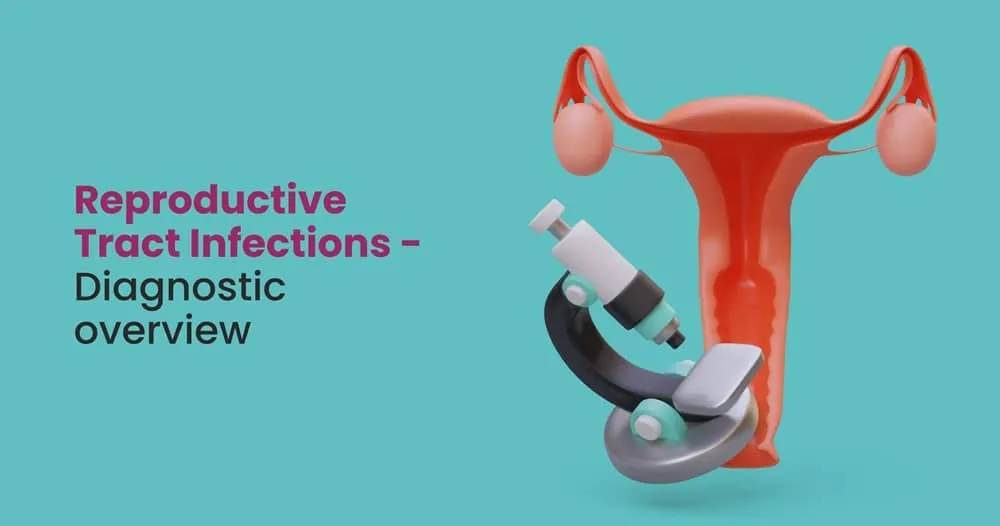Reproductive Tract Infections - A Comprehensive Diagnostic Overview
Oct 30, 2023

Reproductive health is an essential aspect of overall well-being, and maintaining it is of paramount importance. Reproductive tractt infections (RTIs) can pose a significant threat to reproductive health, affecting both men and women. In this blog, we will provide a comprehensive diagnostic overview of RTIs, covering their causes, risk factors, when to seek medical attention, and addressing some frequently asked questions on this important topic.
Causes of Reproductive Tract Infections
Reproductive tract infections can be caused by a variety of microorganisms, including bacteria, viruses, fungi, and parasites. Understanding these causes is important for correct diagnosis and treatment.
- Bacteria
Bacteria are microscopic organisms that can wreak havoc in the reproductive treat, often silently, loading to conditions like chlamydia and gonorrhea. Understanding these culprits is the first step in effective diagnosis and treatment.
- Chlamydia trachomatis: Chlamydia is one of the most prevalent bacterial causes of RTIs. It often presents without noticeable symptoms, making routine testing crucial.
- Neisseria gonorrhoeae: Gonorrhea is another common bacterial infection affecting the reproductive tract and can lead to severe complications if left untreated.
- Viruses
Viruses, such as Human Papillomavirus (HPV) and Herpes Simplex Virus (HSV), are among the leading causes of reproductive tract infections, with potential links to severe health complications. Proper testing and early intervention are crucial for managing these viral threats.
- Human Papillomavirus (HPV): HPV is a common viral infection and a leading cause of cervical cancer. Regular Pap smears and HPV testing are necessary for timely detection.
- Herpes Simplex Virus (HSV): HSV can lead to genital herpes, characterized by painful sores and flu-like symptoms during outbreaks.
- Fungi
Candida albicans, the yeast responsible for common yeast infections, is a fungal culprit that can disrupt the reproductive tract. This infection can affect both men and women and can cause itching, burning, and discomfort in the genital area.
- Parasites
Trichomonas vaginalis is a parasitic infection that poses a lesser-known threat to reproductive health. This infection can cause itching, burning, and discharge and is more common in women than men.
Understanding the causes of reproductive treat infections is the foundation for safeguarding your reproductive health. Now, let's explore the risk factors that can further impact your well-being.
Risk Factors for Reproductive Tract Infections
Certain factors increase the likelihood of developing RTIs. Being aware of these risk factors can help individuals take preventive measures and seek timely medical attention.
- Unprotected Sexual Activity: Engaging in unprotected sexual intercourse with multiple partners raises the risk of RTIs, as it increases the chances of exposure to infected individuals.
- Poor Hygiene: Inadequate genital hygiene can create an environment conducive to infection. It's crucial to maintain proper cleanliness and avoid harsh soaps that can disrupt the natural balance of the reproductive tract.
- Weakened Immune System: a
 compromised immune system, often due to medical conditions or certain medications, can make the body more susceptible to RTIs.
compromised immune system, often due to medical conditions or certain medications, can make the body more susceptible to RTIs. - Intravaginal Practices: The use of douches, sprays, or other intravaginal products can disturb the vaginal area and increase the risk of infection.
- Sexually Transmitted Infections (STIs): Having a pre-existing STI can make the reproductive tract more susceptible to other infections. For instance, individuals with untreated chlamydia or gonorrhea are more vulnerable to other RTIs.
By recognizing and addressing these risk factors, you can take active steps towards healthier and more secure reproductive health.
When to See a Doctor?
Prompt medical attention is crucial when you suspect an RTI or have symptoms. Early diagnosis and treatment can prevent complications and the spread of infections. Here are signs that should prompt a visit to a healthcare professional:
- Unusual Discharge: Any significant change in vaginal or penile discharge, such as color, odor, or consistency, should be evaluated.
- Pain or Discomfort: Persistent pain, burning, or itching in the genital area should not be ignored, as it could indicate infection.
- Painful Urination or Intercourse: Pain during Urination or sexual intercourse is a red flag and requires medical assessment.
- Genital Sores or Blisters: Any unexplained sores, blisters, or lesions in the genital area should be examined by a healthcare provider.
- Foul Odor: a foul or unusual odor from the genital area could indicate an infection and should be checked by a doctor.
- Irregular Menstrual Cycles: Women experiencing irregular menstrual cycles, heavy bleeding, or other menstrual changes should seek medical advice.
- High-Risk Behavior: If you engage in high-risk sexual activities, such as unprotected sex with multiple partners, it's advisable to get regular STI screenings and consult a healthcare professional at the first sign of symptoms.
Summing Up!
Reproductive tract infections are a significant concern for individuals seeking to maintain their reproductive health. Knowing the causes, risk factors and when to seek medical attention can go a long way in safeguarding one’s well-being. Early detection and treatment are key to preventing complications and ensuring a healthy reproductive treat.
If you suspect you have an RTI or are experiencing symptoms, do not hesitate to consult a healthcare professional for guidance and necessary testing and treatment. Prioritizing your reproductive health is an investment in your overall quality of life.
Secure your reproductive health with Apollo Diagnostics. Our expert team offers comprehensive RTI screenings to detect and manage reproductive health issues early. With state-of-the-art facilities and confidential services, we ensure your peace of mind. Take control of your well-being – schedule your RTI screening with Apollo Diagnostics today.
FAQs
1. Can men get reproductive tract infections, or are they exclusive to women?
Reproductive tract infections can affect both men and women. While some RTIs predominantly affect one gender, many, like chlamydia and gonorrhea, can impact both sexes. Everyone needs to be aware of the risks, practice safe se, and seek medical attention if symptoms arise.
2. What are the consequences of leaving an RTI untreated?
Untreated RTIs can lead to severe health complications. In women, they may result in pelvic inflammatory disease (PID), ectopic pregnancies, infertility, and an increased risk of cervical cancer. In men, untreated infections can lead to epididymitis and fertility issues. Moreover, some RTIs can increase the risk of contracting or transmitting other sexually transmitted infections.
3. Are there preventive measures to reduce the risk of reproductive tract infections?
Yes, there are several preventive measures individuals can take:
- Practicing safe sex by using condoms.
- Reducing the number of sexual partners.
- Maintaining genital hygiene without using harsh soaps or douches.
- Getting regular screening and vaccinations (e.g., HPV vaccine for women).
- Treating any existing STIs promptly to prevent complications and further infections.
Related Blog Post
Blog Categories
- Child Health
- Mens Health
- Women's Health
- Mental Health
- Health Myths & Facts
- Fitness
- Nutrition/Recipes
- Remedies
- Weight Management
- Stress Management
- Health Supplements
- Addiction Management
- Disease Management
- Allergy
- Anemia
- Arthritis
- Asthma
- Autoimmune Diseases
- Blood Pressure
- Cancer
- Deficiencies
- Dengue/Malaria/Chikungunya
- Diabetes
- Eye Problems
- Heart Diseases
- Hepatitis
- HIV/AIDS/STD
- Hormonal Imbalance
- Infection/Flu/Viral
- Kidney
- Liver
- Menstrual Problems
- Pregnancy
- Skin & Hair Problems
- Stomach Ailments
- Thyroid
- Others
- Health Checkups
- Diagnostics/Pathology
- Lifestyle & Wellness
- Covid
- Medical Tests
- Cholesterol
- Health Tips
- Parent Care/Old Age
- Lungs
- Food Intolerance








